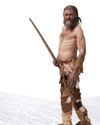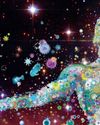Once upon a time, Pluto was a planet. Then one day it wasn’t a planet.

The en That might be the world’s worst bedtime story. But it’s also 100 percent true. Following its discovery in 1930, little Pluto captured the imagination of anyone who looked skyward and wondered about the farthest edges of our solar system. Some people preferred Pluto to the ringed beauty of Saturn or the galactic girth of Jupiter. The man who discovered Pluto went from a small-town hero to a national legend nearly overnight. Pluto, the smallest of planets, became a loveable symbol for any underdog.
Then in 2006, astronomers stripped Pluto of its “planet” status and labeled it a “dwarf planet”— whatever that was. Pluto’s 76-year run as a planet was over.
The story of Pluto is about how things change. Specifically, it’s about how things change in light of new evidence. Pluto’s story is a story about science.
The Dawn of Science
Today we take it for granted, but science, as we know it, has thrived in the Western world for only a little more than 300 years. Prior to that, people often guessed at how the natural world worked. The reason the sun rises and sets, why birds disappear during the winter months, how we sicken, how we heal—educated guesses, traditions, and religious faiths explained all of these natural phenomena. No rigorous way existed to test new ideas about our world.
Then stargazers started to notice that heavenly objects didn’t behave the way tradition said they should. In the early 1500s, Polish astronomer Nicolaus Copernicus proposed an idea that shook the world. He suggested that the Earth and all the other planets revolve around the sun, instead of the other way around. Many refused to accept Copernicus’ ideas.
この記事は Muse Science Magazine for Kids の July/August 2017 版に掲載されています。
7 日間の Magzter GOLD 無料トライアルを開始して、何千もの厳選されたプレミアム ストーリー、9,000 以上の雑誌や新聞にアクセスしてください。
すでに購読者です ? サインイン
この記事は Muse Science Magazine for Kids の July/August 2017 版に掲載されています。
7 日間の Magzter GOLD 無料トライアルを開始して、何千もの厳選されたプレミアム ストーリー、9,000 以上の雑誌や新聞にアクセスしてください。
すでに購読者です? サインイン

A 12-Year-Old Girl's Election Sticker Is a Winner
VOTING IS A FUNDAMENTAL FREEDOM FOR AMERICANS, A MEANS OF DOING ONE'S CIVIC DUTY AND A WAY AN INDIVIDUAL CAN EXPRESS THEIR VOICE. In 1971, the United States lowered its voting age to 18. But that doesn't mean kids and teens under 18 can't participate in elections in various ways.

If everything the human brain does is basically sets of electrical impulses, how exactly does that translate into a state of mind?
You're not the only one asking this question. Every neuroscientist in the world is wondering the exact same thing, says Zach Mainen

EARTH'S TINIEST BUILDERS
THE HIDDEN WORLD OF MICROBES IN THE EARTH'S CRUST

MUMMIES SPEAK
ABOUT MICROBES, MIGRATION, AND MORE

GOING WITH YOUR GUT
HOW DO MICROBES AFFECT OUR HEALTH? LET'S COUNT THE WAYS...

BUG Detective
A burglar sneaks into a house on a quiet street in New York City. He walks through the house, touching countertops and door handles. Finally, he steals a single card from a full deck. Then he leaves.

Little Creatures Among Us THE MANY MICROBES IN OUR DAILY LIVES
When you think you're alone, you're actually not. In the ground, the air, your room, and even your body are Strillions and trillions of creatures so tiny you can't see them.

A Mars Rock Found With Leopard Spots Could Be a Sign of Ancient Life
IN JULY, NASA'S PERSEVERANCE ROVER CAME ACROSS A SPOTTED ROCK IN WHAT WAS ONCE A RIVERBED IN THE JEZERO CRATER ON MARS.

Para Athlete Uses Exoskeleton Suit to Carry the Olympic Torch
In July, a 36-year-old French tennis para athlete, Kevin Piette, got a chance to participate in this summer’s Olympic torch relay without using a wheelchair.

Ancient Egyptians May Have Used a Water System to Lift Stones to Build Pyramid
HOW ANCIENT EGYPTIANS BUILT THE MASSIVE PYRAMIDS IN EGYPT MORE THAN 4,000 YEARS AGO HAS LONG BEEN A TOPIC OF WONDER AND DEBATE.